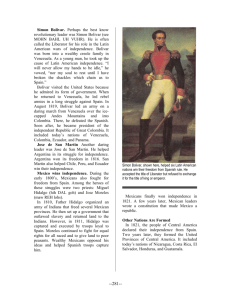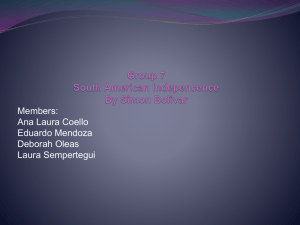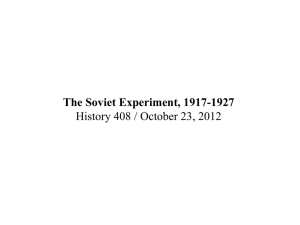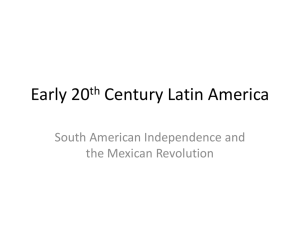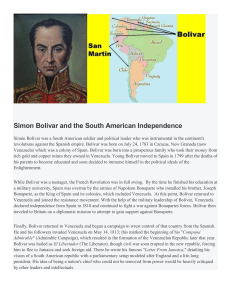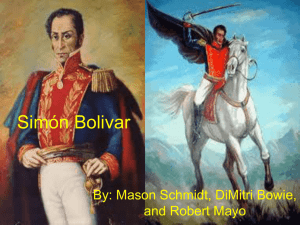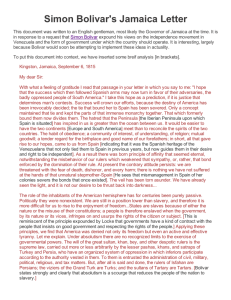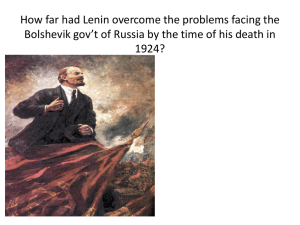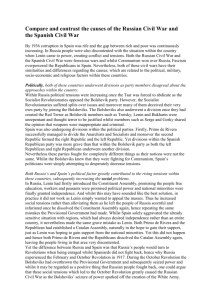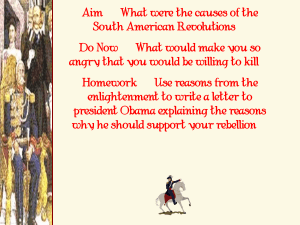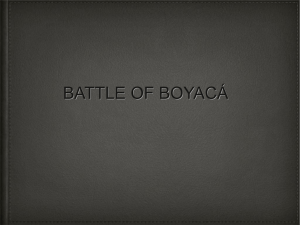Latin America and Russian Revolutions
advertisement
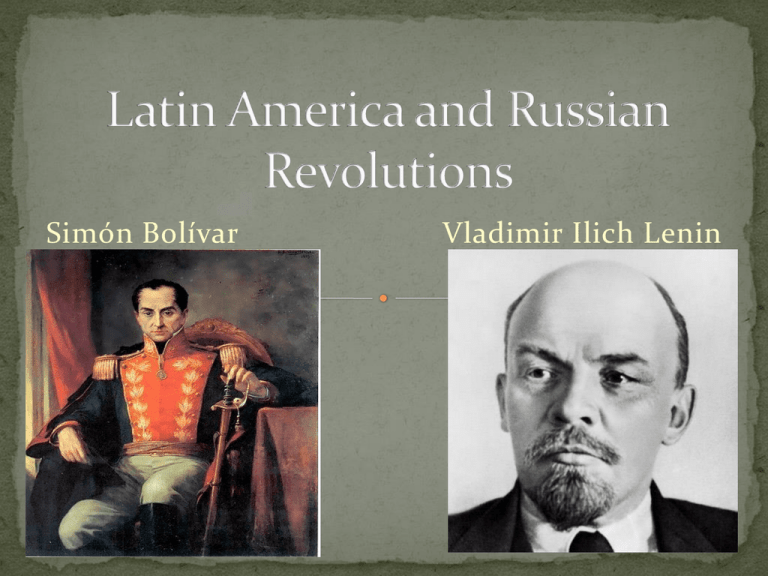
Simón Bolívar Vladimir Ilich Lenin The success of the American Revolution and the French Revolution. The ideas of the Enlightenment thinkers changes peoples thinking about who should control the government. Many of the lower class people were oppressed and disliked due to the fact that they were not born in Spain. Growth of nationalism in Latin America. By the late eighteenth century, the Spanish colonies had a thriving class of creoles: men and women of European ancestry born in the New World. While Creoles were born into wealth and education, they were not allowed to hold any type of political office or hold any important position. Napoleon invades Spain and removes the Spanish king. With Napoleon’s control of Spain weakened its hold over its Latin American colonies. Revolutionary leaders emerge, Toussaint L‘Ouverture Simón Bolívar Toussaint L‘Ouverture was a slave himself but once freed he leads a slave revolt in Haiti but is later deported to Franch where he died. Bolívar, San Martín, and others lead successful revolts in Latin America Spain's Empire in the New World fell and by 1825 all that was left was a few islands in the Caribbean. The continent was free from Spain's grasp, having won their independence at the cost of bloody wars with Spanish and royal forces. Attempts made to rebuild economies and 18 separate republics are set up. Wealthy Venezuelan creole. Bolívar was sent to Spain for his education. Known as the Liberator. In 1810, Simon Bolivar joined the group of patriots that seized Caracas in Venezuela and proclaimed independence from Spain. He went to Great Britain in search of aid, but could get only a promise of British neutrality. He and his followers invaded Venezuela on May 14, 1813; this marked the beginning of his "Compana Admirable," (Admirable Campaign) which resulted in the formation of the Venezuelan Second Republic later that year. Dec 1819 , Simon Bolivar returned to Angostura and became the first president of the original republic of Colombia (now Ecuador, Colombia, Panama, and Venezuela). Jun 1821 Simon Bolivar crushed the Spanish army at Carabobo in Venezuela. Bolivar’s vision of a united South America Present day Colombia, Ecuador, Venezuela, and Panama Short-lived due to dissension amongst various factions. Bolivar resigned in 1828 In 1830, Bolivar’s Gran Colombia divided into Colombia, Ecuador, Venezuela. Panama later split from Colombia with US assistance in 1903. The Upper and Lower class were becoming more apparent. There was no middle class. In 1917, there was a shortage of bread and prices began to rise. The people no longer respected the Tsar, Nicholas II, who was an Autocrat. The rise of the industrial jobs led to poor working conditions for the common worker and little pay. Land was being taken by the Government for Nobles. Hardships of World War I- Millions of weapons available in the hands of the oppressed peasants and workers due to their conscription to the army. Negligence and poor judgment of the last Tsar Nicholas II. Czar Nicholas II was dethroned in Russia during this, the "February Revolution.“ (Took place March 8-12) When V. I. Lenin arrived from exile in the spring of 1917, he joined the Bolshevik Party in Russia whose goal was to overthrow the Provisional Government and set up a government for the proletariat. The Bolshevik party went on the offensive and tried to educate the workers and soldiers, convincing them to seize power and land for themselves. In early October, Lenin convinced the Bolshevik Party to form an immediate insurrection against the Provisional Government. The armed workers known as Red Guards and the other revolutionary groups moved on the night of Nov. 6-7 under the orders of the Soviet's Military Revolutionary Committee. These forces seized post and telegraph offices, electric works, railroad stations, and the state bank. Once the shot rang out from the Battleship Aurora, the thousands of people in the Red Guard stormed the Winter Palace. The Provisional Government had officially fallen to the Bolshevik regime. V. I. Lenin, the leader of the Bolsheviks, announced his attempt to construct the socialist order in Russia. The new government made up of Soviets, and led by the Bolsheviks. 1918 – After Russia is out of The Great War on March 8, The Bolshevik Party changes its name to the Communist Party Russia enters a Civil War for two years 1918- 1920 August 30 - An assassination attempt leaves Lenin seriously wounded December 15, 1922 - Lenin suffers second stroke and retires from politics December 30 - The Union of Soviet Socialist Republics (U.S.S.R.) established January 21, 1924 - Lenin dies; Stalin will become his successor

